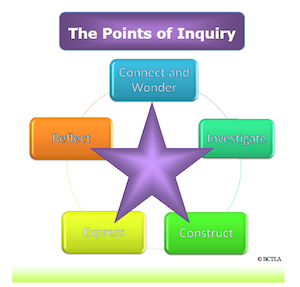The innate human drive for connectivity is a cause for hope in education; we can turn interactions from confrontational to conversational.
Today in our inquiry groups, Charlotte, Brianne, Kristin and myself dove head-first into processing and sharing the mass of research we’ve discovered and linked through Mindmeister. Each one of us was interested in finding substantial research and pedagogy for the use of social media in the classroom, not just its uses. Through our discussion and research exploration it became apparent: social media in education is useful, so use it! The research outlined numerous fundamental reasons for its purposeful and innovative use in the classroom, such as:
- social networking is ubiquitous and students need to learn to use it purposefully
- increased student engagement
- increased student self-confidence
- authentic learning experiences
- to facilitate multiliteracies, especially critical literacy
- opportunities for problem-solving skills and judgement
- to foster connections, with world experts, with divergent ideas, with peers and community
However, social media use is not without its hazards as numerous educational articles warned, such as “Pros and Cons of Social Media Use” from Syracuse University. We identified two major concerns:
- lack of face-to-face time, potential deterioration of social skills
- use of social media for complaint , rather than purposeful connection, communication and action
But these are problems with our current curriculum and pedagogy. There is an undervaluing of social skill development in the curriculum. Further, although there are over-arching mandates such as schools are required to foster social responsibility, there are no clear mandates that require and promote authentic, purposeful action in the world-at-large. These are significant skill-sets and values that need to be addressed, but in the current institutional isomorphic system, whether through physical or virtual classroom practices, the underlying necessity of meeting the needs of essential new competencies is not addressed. This is where linguistic cognitive holds power and hope.
Numerous proponents of using social media and digital environments/platforms in the classroom explain that it fosters numerous necessary competencies and opportunities. As a small inquiry group we also noted that numerous advocated skills, such as judgement, play as a form of learning, critical literacy, problem-solving, inquiry and collaboration are all possible through ICT, but not entirely required. If one explored and collaborated with colleagues they would see that there are numerous “old-school” methods that also promote these competencies and bring them into the classroom in other physical, flesh and bone ways. For example, in the following “Education Next” publication, it expresses the reality that social learning has been utilized for centuries. True, as a system we are not yet meeting the needs our students’ futures require, yet through the linguistic cognitive domain there is hope. Numerous “new literacies” already have a place within individual classrooms and individual teacher’s practices. Rather than confronting with phrases that evoke a sense of demand or inability, we need to use our language to show the present connection and empowerment. We need to ensure that through our language, we use it as a connective force, to other educators, to administration, to the community, to politicians, and beyond. According to the biologist Mark Pagel in the TED Talks video “How language transformed humanity,” we as a species evolved our complex system of language, our “piece of social technology” to access a powerful new tool: cooperation. I for one agree, and continue to respect and hope through this powerful “social technology” that is language.


